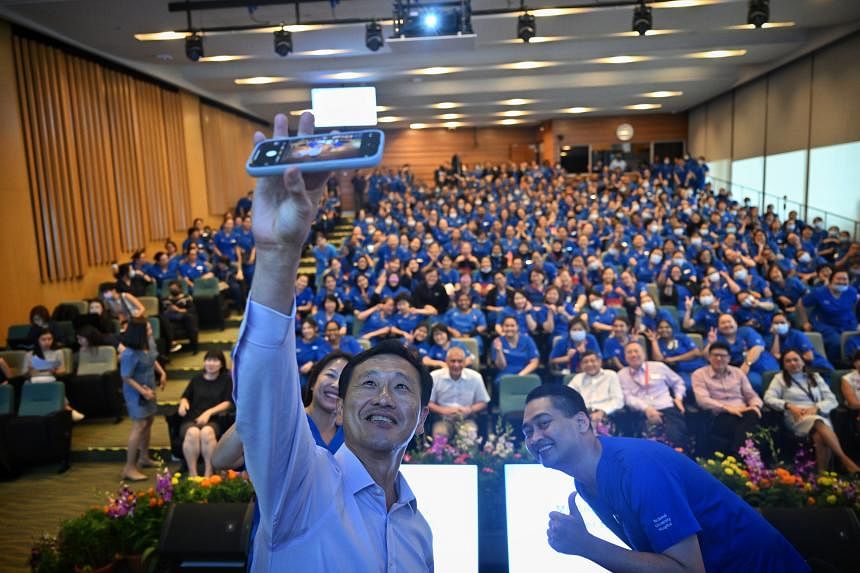SINGAPORE
About 29,000 nurses to get up to $100,000 in payouts over 20 years under new retention scheme
Health Minister Ong Ye Kung taking a wefie with attendees at National University Hospital’s LUVing Nurses Forum on Feb 20.
ST PHOTO: ARIFFIN JAMAR
Joyce Teo and Leow Wen Xuan
UPDATED
FEB 20, 2024,
SINGAPORE – About 29,000 nurses are set to receive up to $100,000 in payouts over the next 20 years under a new long-term retention scheme for nurses working in the public healthcare system.
Health Minister Ong Ye Kung announced this at an event at the National University Hospital (NUH) on Feb 20.
The Award for Nurses’ Grace, Excellence and Loyalty (Angel) scheme starts in September.
Under the scheme, all new and in-service nurses aged below 46 years old who are working in the public healthcare institutions will receive payouts every four to six years, with each payout ranging from $20,000 to $30,000.
Over the next 20 years of their career, or up to the prevailing retirement age, they could receive a total payout of potentially up to $100,000.
Foreign nurses who have been in continuous service for at least four years as at or after September 2024 will also be eligible for the same quantum and frequency of payouts.
Nurses aged 46 years and above will each receive a one-off recognition payout of $5,000 to $15,000, depending on their years of service and if they have been in service for at least five years, the Ministry of Health (MOH) said in a release.
Subsequently, their payouts will be on an accelerated schedule, and they will receive payouts every three years. The maximum payout per nurse is up to $100,000, or when they reach the prevailing retirement age, whichever is sooner, MOH added.
Nurses on post-retirement contracts will also receive the one-off recognition payout if they have at least five years’ service, but no details are available at the moment.
Of the 29,000 nurses that stand to benefit from the scheme, almost 24,000 nurses will be from public healthcare institutions. The other 5,000 nurses are expected to be from publicly funded community care organisations and social service agencies, if their employers apply to participate in the scheme. These employers will need to co-fund the awards, with the majority of the funding coming from the government.
Mr Ong said that nurses at certain ages or after a certain number of years in service are particularly likely to contemplate leaving for personal and family reasons. They may want to start a family, further their studies, take care of aged parents or try out new opportunities.
“A retention scheme signals to these officers – please think twice and give yourself and give us a chance. As employers, we can help address these dilemmas and trade-offs in life, and help you stay in a career that you will find meaning (in) and continue to make a very positive impact. On your part, if you stay on, perhaps after a while, things do work out,” he said.
The Angel scheme is among a slew of initiatives aimed at attracting and retaining nurses that have been introduced over the years, including building a healthy flow of nursing graduates from local institutes.
Singapore has grown nursing intake numbers by about 30 per cent from 2013 to 2023. This means that for every 25 students, one will go into a nursing programme, said Mr Ong.
Singapore is currently experiencing a tight bed situation in the hospitals. At the same time, it is expanding healthcare capacity as healthcare demands are rising. Nurses are in shortage, especially after the higher-than-usual attrition of foreign nurses during the Covid-19 pandemic, but the Government has since made up for that, said Mr Ong.
Since end-2022, there have been more than 5,600 nursing job offers accepted, of which about 4,500 have been newly registered. This surpassed the 3,400 new nurses that were registered in 2022.
4,000 nurses hired in 2023 for Singapore’s public hospitals as attrition rate rises
Salary guidelines to help community care sector be more competitive in retaining talent
Mr Ong said the Government will continue to sustain the strong momentum for the recruitment of both local and foreign nurses in 2024 and beyond.
About 24,000 employees in the public healthcare clusters are nurses – they make up one-third of the 65,000-strong healthcare workforce.
Dr Karen Koh, who became the chief nurse at NUH at the start of 2024, said the scheme allows the hospital to appreciate every nurse in its service, be they locals or foreigners, and is timely, given the recent exodus of nurses and rising healthcare needs.
It would not only encourage nurses to continue in service but help NUH with the overall workload, as it takes at least six months to onboard a local nurse, and up to a year to onboard a foreign nurse, she said.
Furthermore, young nurses are more mobile these days, and Singapore-registered nurses are in demand, so this is another way of retaining them, said Dr Koh.
Mr Muhammad Hafashah Mohd Aslam, a 37-year-old nurse clinician with NUH’s General Intensive Care Unit, was among the happy faces at the NUH event where the announcement of the scheme was made. He completed a law degree while working as a nurse at NUH, where he has stayed for 12 years, and is excited to see what the future of healthcare holds, when hospital care could be provided at home.
No comments:
Post a Comment